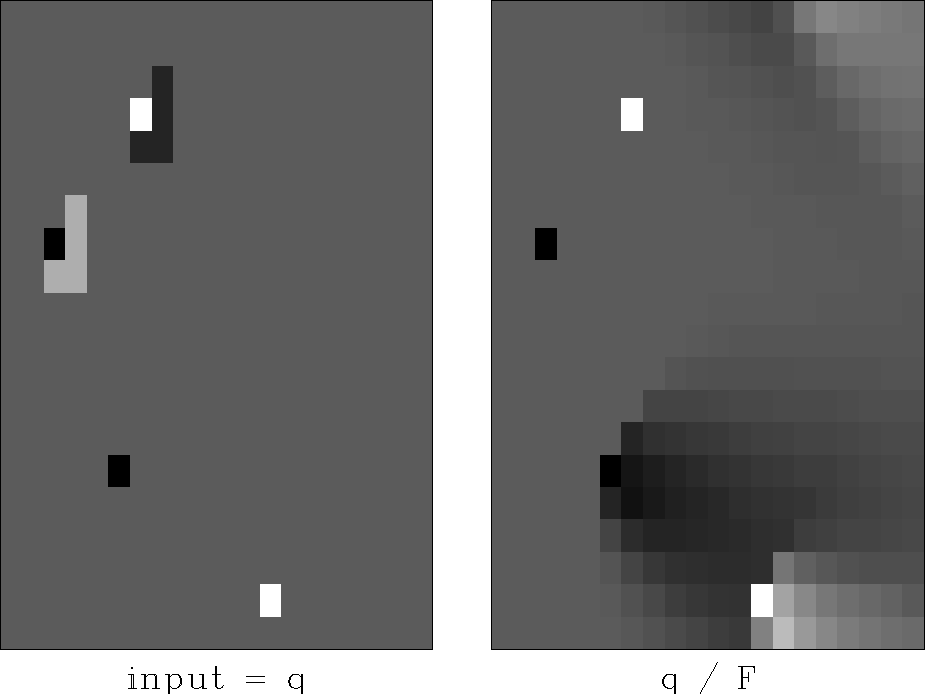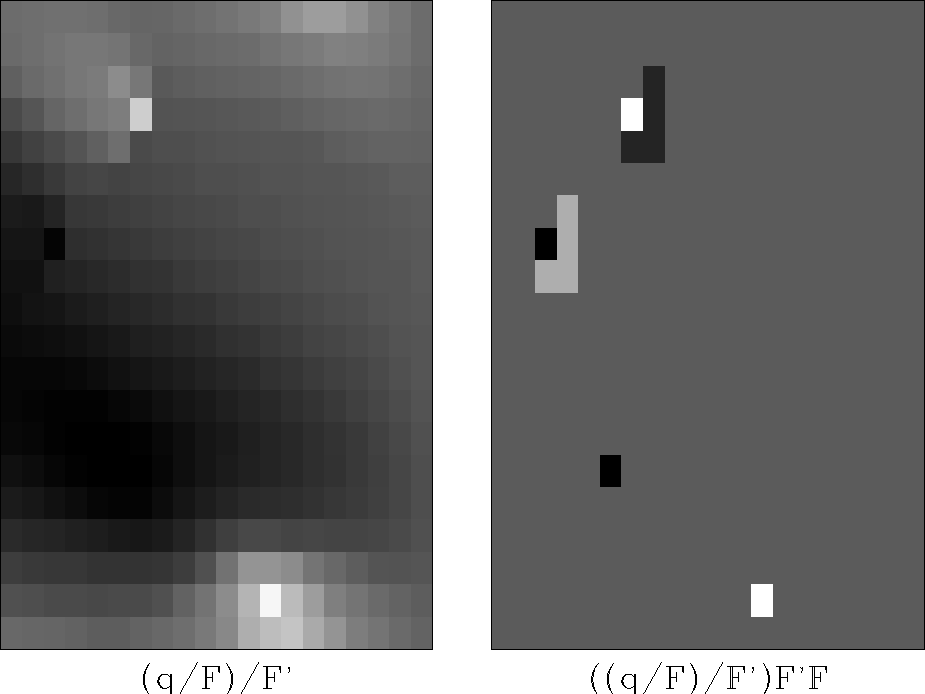




Next: Finite differences on a
Up: Multidimensional recursive filters via
Previous: The helix filtering idea
Figures
7 and 8 contain this 2-D filter
| ![\begin{displaymath}
\left[
\begin{array}
{cc}
0 & -1/4 \\ 1 & -1/4 \\ -1/4 & -1/4
\end{array} \right]\end{displaymath}](img16.gif) |
(3) |
Let us experiment using this 2-D filter as a recursive filter.
In Figure 7 the input is shown on the left.
This input contains two copies of the filter (3)
near the top of the frame
and some impulses near the bottom boundary.
The second frame in Figure 7 is the result
of deconvolution by the filter (3).
Notice that deconvolution
turns the filter itself into an impulse,
while it turns the impulses
into comet-like images.
The use of a helix is evident
by the comet images wrapping around the vertical axis.
wrap
Figure 7
Illustration of 2-D deconvolution.
Left is the input  . Right is after deconvolution
. Right is after deconvolution  with the filter (3).
with the filter (3).

hback
Figure 8
Left is  and right is
and right is
 .
.

Using the result of Figure
7 as an input,
the first frame in Figure
8
results from backwards recursion,
filtering backwards along the helix, the adjoint operator  .The adjoint blows energy leftward.
Filtering forward and backwards has implemented
a symmetrical smoothing operator
.The adjoint blows energy leftward.
Filtering forward and backwards has implemented
a symmetrical smoothing operator  .The last frame in Figure 8
shows that the two deconvolution smoothers can be inverted
by convolution,
convolving once with filter (3)
and once with its adjoint (reverse on both axes).
We see we are back where we started.
No errors, no evidence remains of any of the boundaries
where we have wrapped and truncated.
Using the helix, we find that
one-dimensional polynomial division is a rapidly invertible
multidimensional
transformation,
one with many adjustable parameters.
.The last frame in Figure 8
shows that the two deconvolution smoothers can be inverted
by convolution,
convolving once with filter (3)
and once with its adjoint (reverse on both axes).
We see we are back where we started.
No errors, no evidence remains of any of the boundaries
where we have wrapped and truncated.
Using the helix, we find that
one-dimensional polynomial division is a rapidly invertible
multidimensional
transformation,
one with many adjustable parameters.





Next: Finite differences on a
Up: Multidimensional recursive filters via
Previous: The helix filtering idea
Stanford Exploration Project
6/2/1998
![\begin{displaymath}
\left[
\begin{array}
{cc}
0 & -1/4 \\ 1 & -1/4 \\ -1/4 & -1/4
\end{array} \right]\end{displaymath}](img16.gif)
![\begin{displaymath}
\left[
\begin{array}
{cc}
0 & -1/4 \\ 1 & -1/4 \\ -1/4 & -1/4
\end{array} \right]\end{displaymath}](img16.gif)


![]() .The adjoint blows energy leftward.
Filtering forward and backwards has implemented
a symmetrical smoothing operator
.The adjoint blows energy leftward.
Filtering forward and backwards has implemented
a symmetrical smoothing operator ![]() .The last frame in Figure 8
shows that the two deconvolution smoothers can be inverted
by convolution,
convolving once with filter (3)
and once with its adjoint (reverse on both axes).
We see we are back where we started.
No errors, no evidence remains of any of the boundaries
where we have wrapped and truncated.
Using the helix, we find that
one-dimensional polynomial division is a rapidly invertible
multidimensional
transformation,
one with many adjustable parameters.
.The last frame in Figure 8
shows that the two deconvolution smoothers can be inverted
by convolution,
convolving once with filter (3)
and once with its adjoint (reverse on both axes).
We see we are back where we started.
No errors, no evidence remains of any of the boundaries
where we have wrapped and truncated.
Using the helix, we find that
one-dimensional polynomial division is a rapidly invertible
multidimensional
transformation,
one with many adjustable parameters.